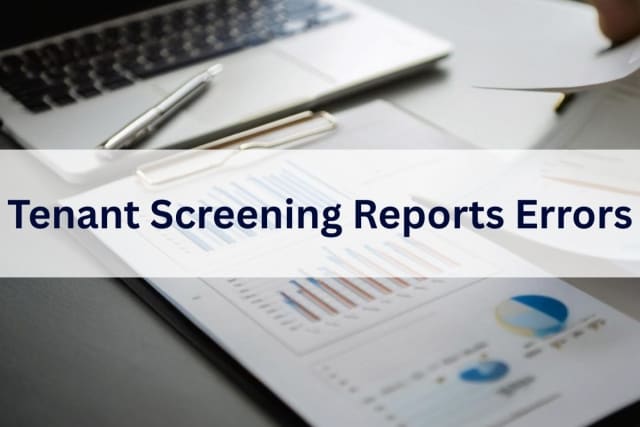For millions of renters, finding a place to call home is already a monumental challenge, especially amidst an affordable housing shortage and increasingly expensive housing. What many don’t realize is that an additional, often invisible, barrier exists: tenant screening reports errors.
These seemingly minor discrepancies can have devastating consequences, leading to denied applications, prolonged housing searches, and even homelessness.
The tenant screening services market is a significant and growing industry, valued at USD 1.76 billion in 2024 and projected to reach USD 1.85 billion in 2025.
This growth is driven by property management companies’ increasing reliance on these reports to assess risk. However, with this expansion comes a critical need for accuracy and transparency.
The Anatomy of a Tenant Screening Report
A typical tenant screening report is a comprehensive compilation of a rental applicant’s history, designed to help landlords and property management companies make informed leasing decisions. These reports often include:
- Credit Report & Credit Score: This details the applicant’s financial health, including debts, payment history, and any bankruptcies. Disparities in credit scoring can disproportionately affect certain groups, creating a veneer of objectivity that masks underlying systemic issues.
- Criminal Records & Criminal History: This section checks for past criminal convictions, arrest records, and sex offender registry status. Errors here can range from reporting expunged records to “Mixed Files,” where one applicant’s Social Security numbers are mistakenly linked to another person’s criminal court records.
- Eviction Records & Rental History: Perhaps the most impactful, this details past eviction filings, judgments, and previous landlord references. Even a dismissed eviction filing can show up, creating an insurmountable barrier for people, despite the case’s favorable outcome.
- Employment Verification: Confirms employment dates and income.
- Identity Verification: Ensures the applicant is who they say they are, often checking for signs of Identity Theft.
These reports are compiled by various tenant screening companies, which are considered consumer reporting agencies (CRAs) under federal law.

The Pervasive Problem of Tenant Screening Report Errors
Inaccurate records are more common than many people realize. A recent study by a tenant screening service provider revealed that 1 in 7 traditional tenant background checks contains inaccurate or missing data.
This means that hundreds of thousands, if not millions, of renters annually could be unfairly denied housing due to errors that are entirely out of their control.
Common errors found in tenant screening reports include:
- Mixed Files: This is a prevalent and particularly damaging error where information belonging to one individual is mistakenly combined with another’s. For example, someone with a similar name or Social Security number might have their eviction records or criminal convictions appear on your report.
- Outdated or Incomplete Information: This can involve reporting old debts that have been paid off, dismissed criminal charges, or eviction filings that were resolved in the tenant’s favor but still appear without context. The Fair Credit Reporting Act (FCRA) generally mandates that most negative information cannot be reported after seven years, with bankruptcies limited to 10 years and eviction filings to seven years from the filing date.
- Incorrect Criminal Records: This includes reporting arrests without their disposition (e.g., dismissal or acquittal), or misclassifying misdemeanors as felonies. Sealed or expunged records should not appear on screening reports at all.
- Credit Report Discrepancies: Incorrect payment histories, closed accounts listed as open, duplicate accounts, or even accounts that don’t belong to the applicant can severely depress a credit score.
- Missing Positive History: Sometimes, positive rental history or timely payments are not accurately reflected, painting an unfairly negative picture.
These background check errors create significant barriers for people seeking rental housing, leading to denied applications, lost application fees, and the emotional distress of being unfairly judged.
Disproportionate Impact and Discrimination in Housing
The impact of inaccurate tenant screening reports is not evenly distributed. Racial disparities are a significant concern within the tenant screening industry.
In 2023, there were 34,150 fair housing complaints received by various agencies, marking the highest number since the National Fair Housing Alliance (NFHA) began reporting its Trends Reports.
Studies have shown how data-matching assumptions used by screening CRAs can lead to vastly different outcomes for individuals, particularly those with common names.
For instance, an Urban Institute and Avail survey highlighted how variations in data matching can change the number of criminal and eviction records attributed to individuals by hundreds of thousands.
A person with a common name like “Jose Gomez” could be associated with significantly more criminal and eviction records under more relaxed data-matching assumptions, simply because multiple individuals share that name.
This highlights concerns about “discrimination in housing” when screening companies use automated tools, including artificial intelligence (AI), without sufficient safeguards. While AI can improve efficiency, its deployment needs diligent oversight to reduce human bias and error.

Without clear screening rules and strong checks, these systems can keep racial unfairness. This creates big problems for people of color and other protected groups. It makes it harder for them to find renters and get affordable housing.
Your Consumer Rights: The Fair Credit Reporting Act (FCRA)
Federal law provides crucial consumer protection through the Fair Credit Reporting Act (FCRA). This act applies to tenant screening companies, requiring them to:
- Ensure Accuracy: Tenant screening companies must follow “reasonable procedures to assure maximum possible accuracy” of the information they report.
- Provide Disclosure: If a landlord takes an adverse action (like denying your application, requiring a co-signer, or demanding a higher deposit) based on a screening report, they must provide you with an “adverse action notice.” This notice must include the name, address, and phone number of the reporting agency that provided the report.
- Right to a Free Report: You are entitled to a free copy of your tenant screening report if an adverse action has been taken against you based on its contents. You must request it within 60 days of receiving the adverse action notice.
- Right to Dispute Errors: If you find inaccurate or incomplete information on your report, you have the right to dispute it with the reporting agency. The reporting agency generally has 30 days (sometimes 45) to investigate your dispute and correct any errors. Sealed or expunged records should be removed.
Many rental applicants, often desperate to secure housing, are unaware of these rights or the dispute process. The Consumer Financial Protection Bureau (CFPB) has highlighted that “renters bear the costs of errors and false information in these reports, [yet] they have few avenues to make tenant screening companies fix their sloppy procedures.”
Taking Action Against Tenant Screening Report Errors
If you believe you’ve been unfairly denied housing due to inaccurate tenant screening reports, here are the steps to take:
- Request Your Report: Immediately request a copy of the tenant screening report from the reporting agency named in the adverse action notice. Some companies offer a “Candidate Portal” for easy access.
- Review Meticulously: Go through every detail. Check your personal information, Social Security numbers, credit report, criminal records, and eviction records. Look for any “Inaccurate Records” or “Mixed Files.”
- Gather Evidence: Collect any documentation that proves the information is incorrect. This could include court documents showing a dismissed case, proof of payment for a debt, or accurate rental receipts.
- File a Formal Dispute: Submit a written dispute to the tenant screening company. Identify each error and provide your supporting documentation. Sending it via certified mail can provide proof of delivery.
- Inform the Landlord: Let the landlord know you are disputing the information. While they might still move on to other applicants, it’s essential for your record.
- Consider Legal Action: If the screening company fails to correct the errors after a reasonable investigation (typically 30 days), or if you suffered damages (like lost housing opportunities or additional costs) due to their negligence, you may have legal options. Consult a staff attorney at a consumer rights or fair housing organization, or a law firm specializing in consumer protection law. Organizations like the Legal Services Corporation (LSC) provide crucial legal assistance to low-income individuals facing such issues.
The housing market is challenging enough. Don’t let tenant screening report errors create insurmountable barriers to finding a home.
Understanding your consumer rights and taking proactive steps can help you fight back against misinformation and secure the housing you deserve.
If you suspect an inaccurate rental report has affected your housing application, seek legal services today to understand your rights and options.



